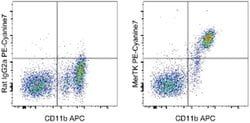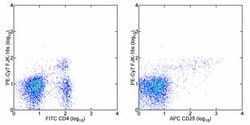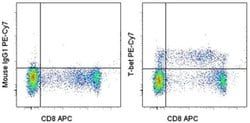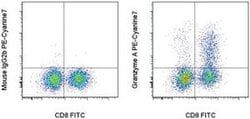MERTK Monoclonal Antibody (DS5MMER), PE-Cyanine7, eBioscience™, Invitrogen™
Rat Monoclonal Antibody
Manufacturer: Fischer Scientific
The price for this product is unavailable. Please request a quote
Antigen
MERTK
Concentration
0.2 mg/mL
Classification
Monoclonal
Form
Liquid
Regulatory Status
RUO
Formulation
PBS with 0.09% sodium azide; pH 7.2
Gene Alias
c-Eyk; c-mer; c-mer proto-oncogene tyrosine kinase; Eyk; MER; MER proto-oncogene, tyrosine kinase; MER receptor tyrosine kinase; MERTK; MGC133349; nmf12; Nyk; Proto-oncogene c-Mer; proto-oncogene tyrosine-protein kinase MER; rdy; receptor tyrosine kinase MerTK; Receptor tyrosine tinase gene probably the gene for Rdy; retinal dystrophy; RP38; sMER; sMERTK; soluble MER; soluble MERTK; STK kinase; Tyro 12; Tyro12; Tyrosine-protein kinase Mer
Gene Symbols
Mertk
Isotype
IgG2a κ
Purification Method
Affinity chromatography
Product Type
Antibody
Clone
DS5MMER
Applications
Flow Cytometry
Conjugate
PE-Cyanine7
Host Species
Rat
Target Species
Mouse
Gene Accession No.
Q60805
Gene ID (Entrez)
17289
Immunogen
FC-tagged full protein expressed in insect cells
Primary or Secondary
Primary
Content And Storage
4° C, store in dark, DO NOT FREEZE!
Gene
Mertk
Description
- Description: This DS5MMER monoclonal antibody recognizes mouse MerTK, a 170-210 kDa member of the TAM family of tyrosine kinase receptors that also includes Axl and Tyro3
- MerTK is expressed on tissue macrophages and is involved in the removal of apoptotic cells
- This process relies on two soluble ligands of MerTK, Protein S and Gas6 that bind to phosphatidylserine found on the outer leaflet of the plasma membrane of cells undergoing apoptosis
- Upon binding these ligands, MerTK undergoes autophosphorylation at multiple tyrosine residues that activate the PI3K and Akt pathways
- This results in the phagocytosis of apoptotic cells and also results in the direct inhibition of TLR-induced production of pro-inflammatory cytokines
- In addition, MerTK may function as a putative entry receptor for filoviruses
- Deficiency of MerTK causes general autoimmunity, inflammation and accumulation of apoptotic bodies
- MerTK is constitutively released from the cell surface by metalloproteinases and thus is present in the serum and culture medium
- This process can be enhanced by stimulation with LPS
- MerTK can be used to help discriminate macrophages from dendritic cells
- MerTK is often expressed on maligt cells and may be implicated in immune evasion
- The DS5MMER antibody will work on paraformaldehyde-fixed cells
- Applications Reported: This DS5MMER antibody has been reported for use in flow cytometric analysis
- MERTK Monoclonal antibody specifically detects MERTK in Mouse samples
- It is validated for Flow Cytometry.



